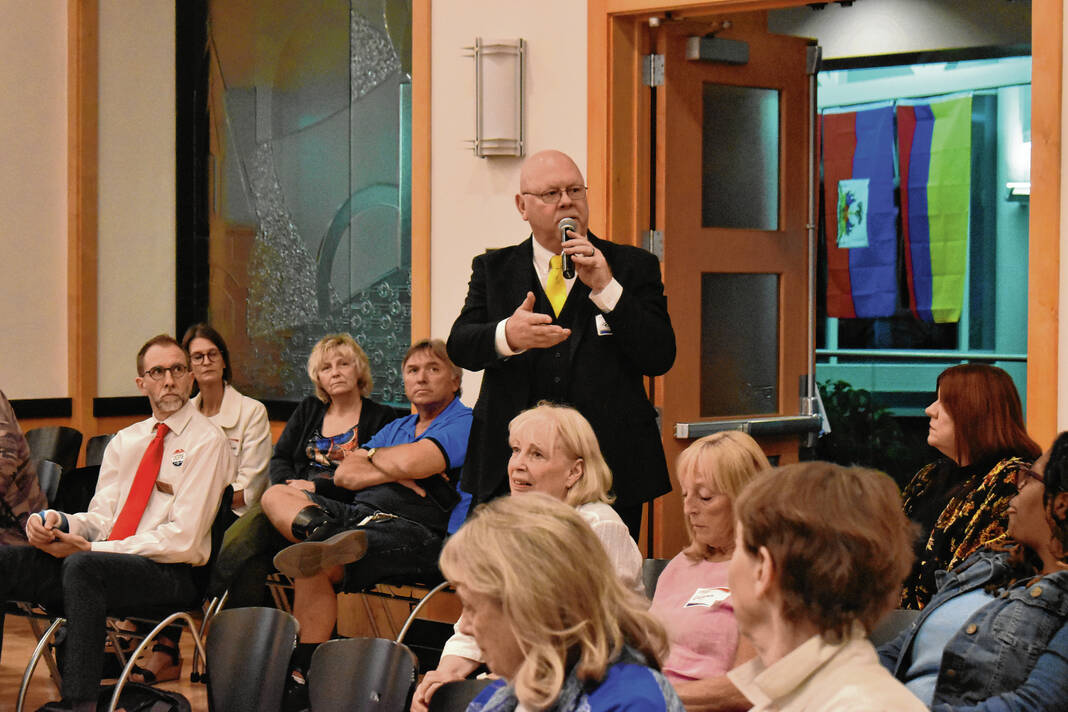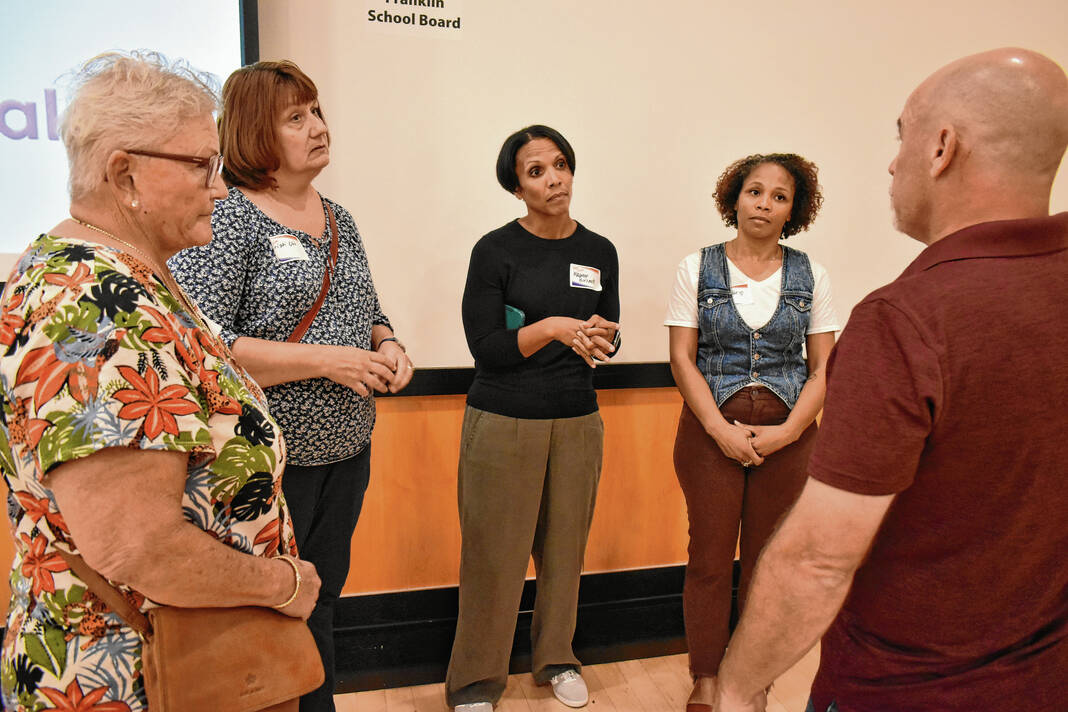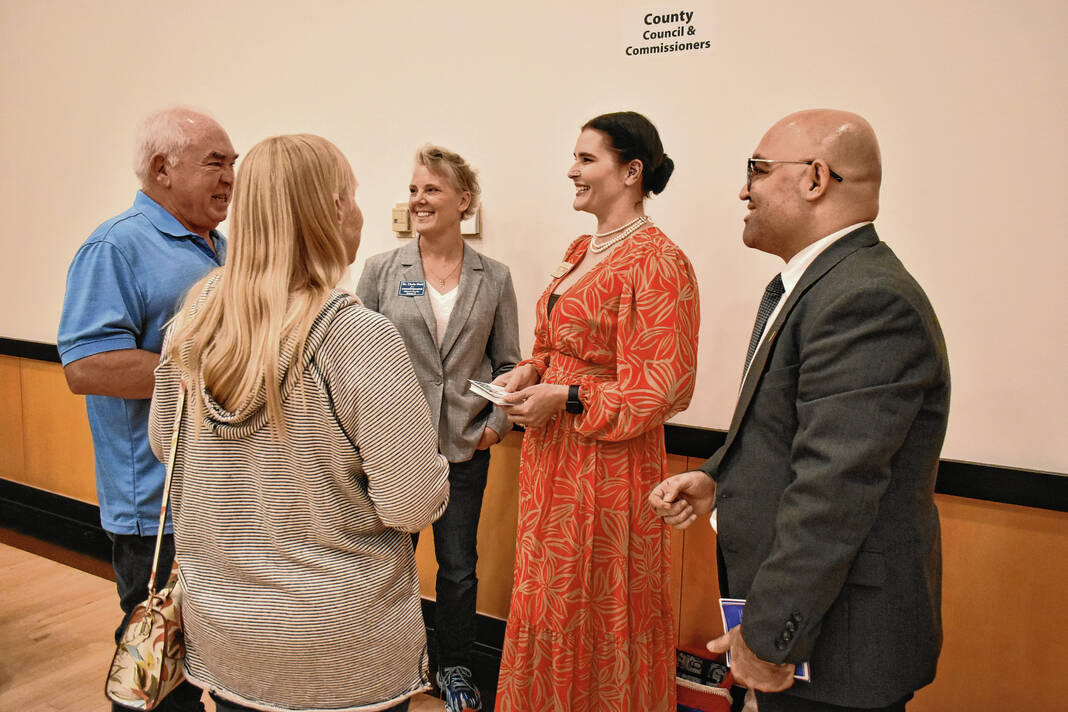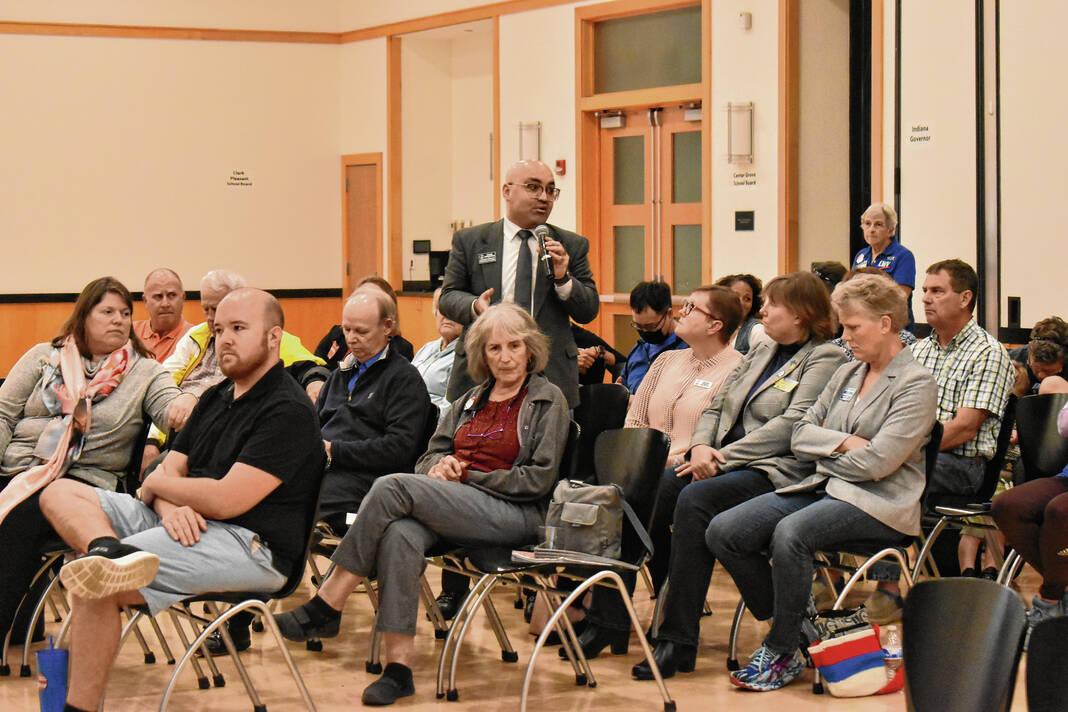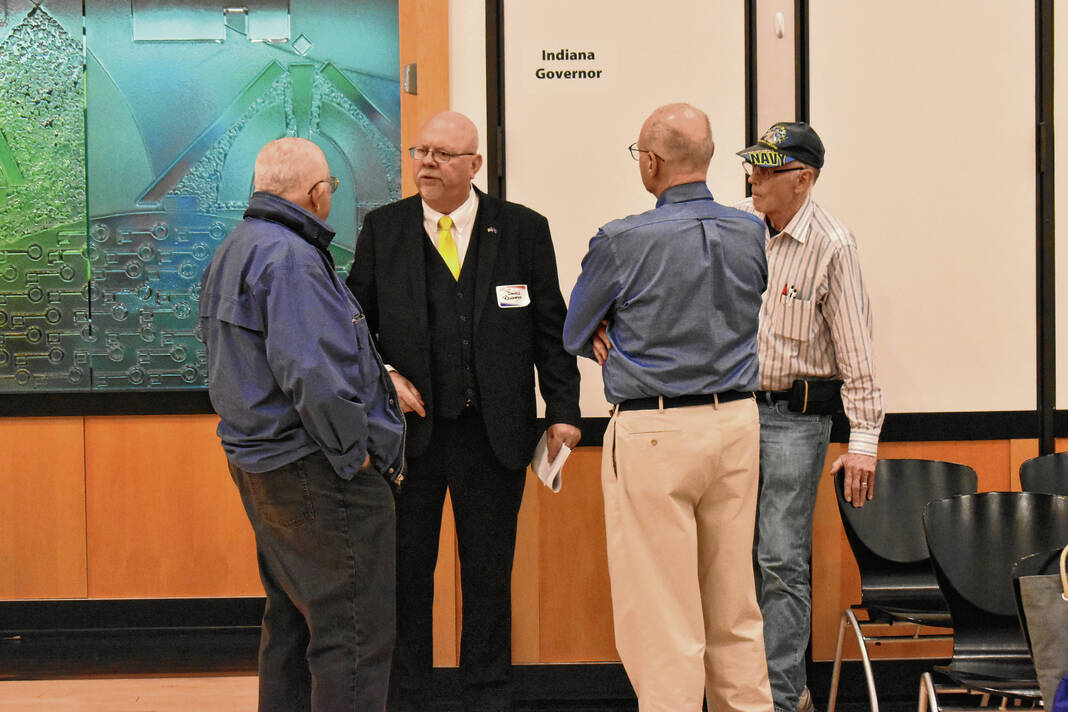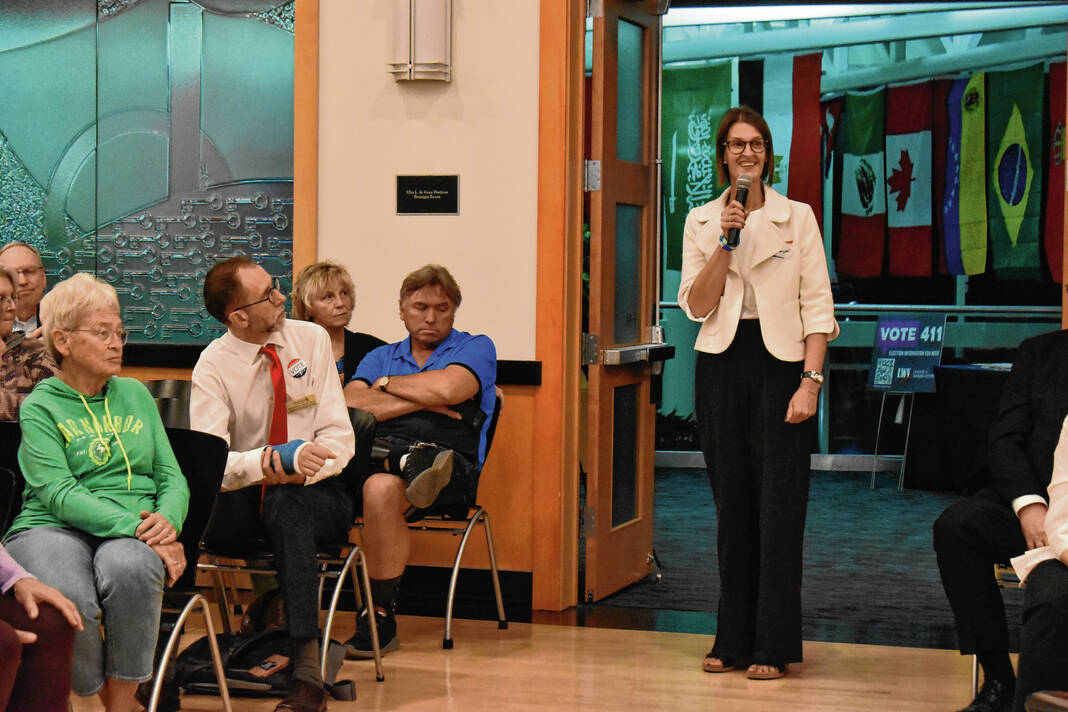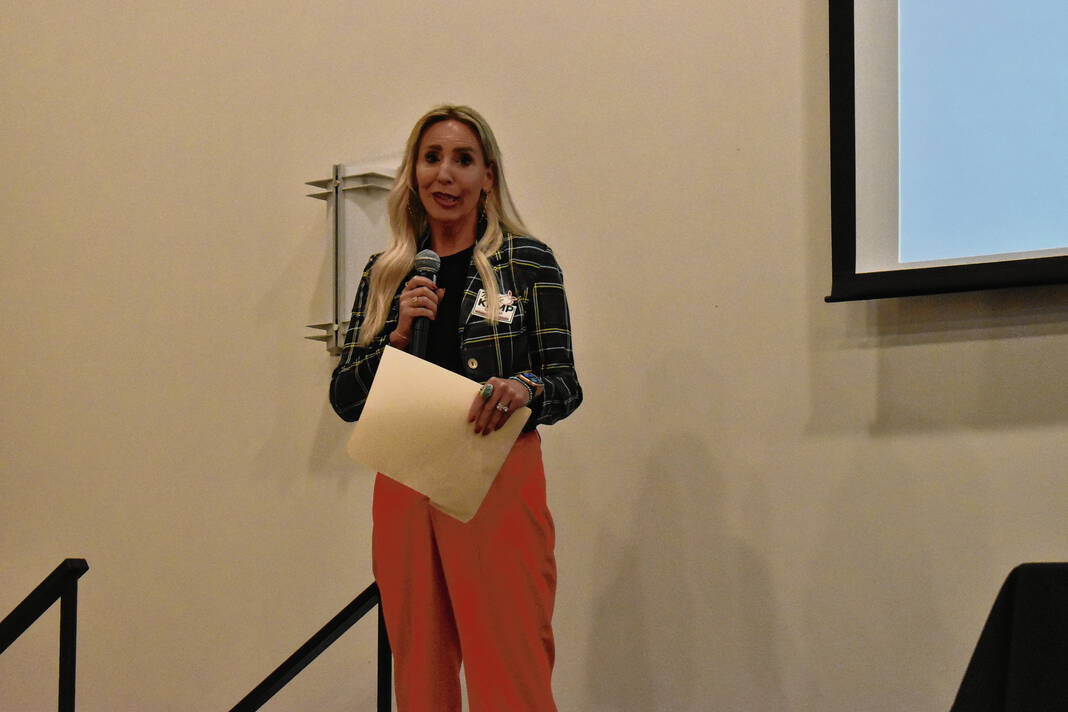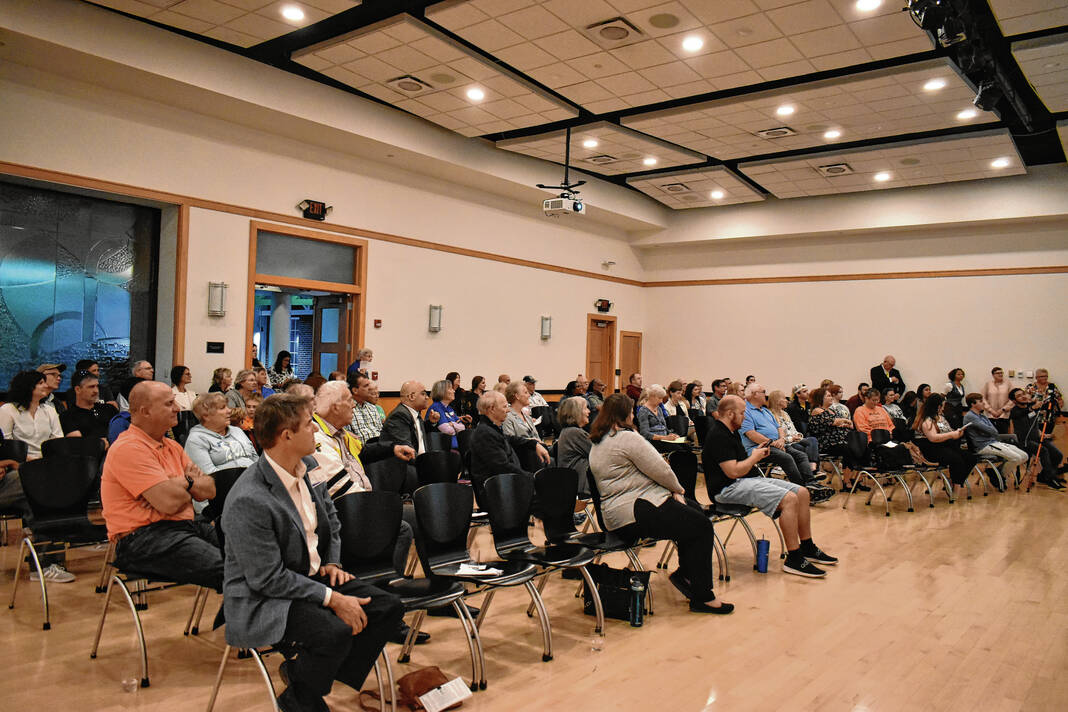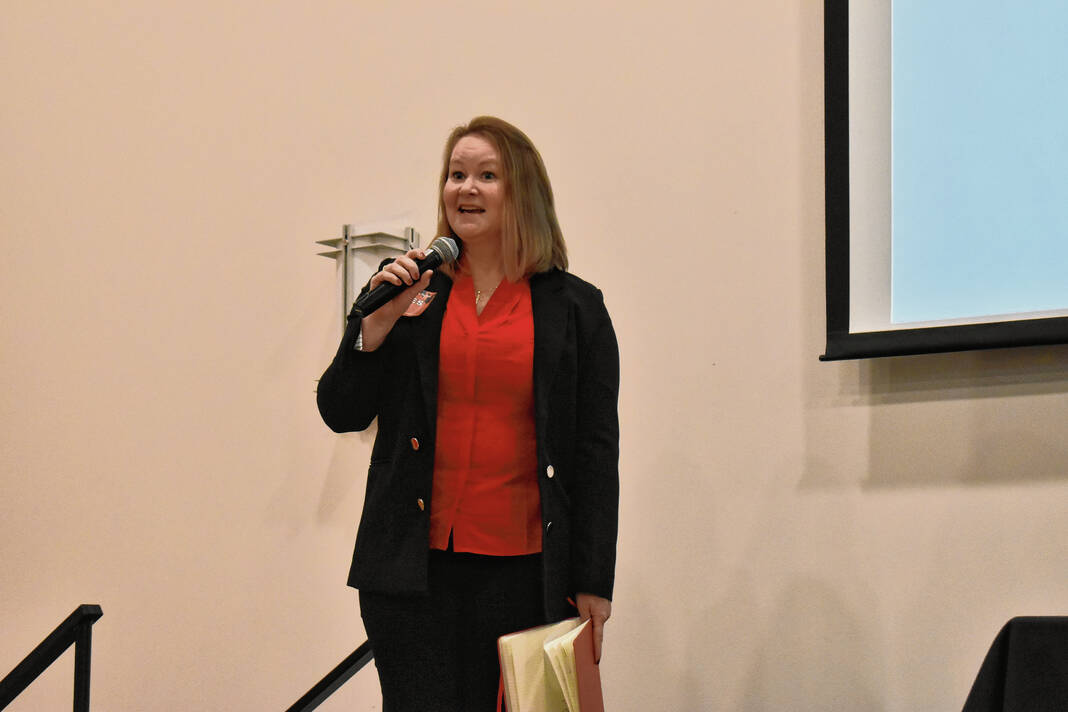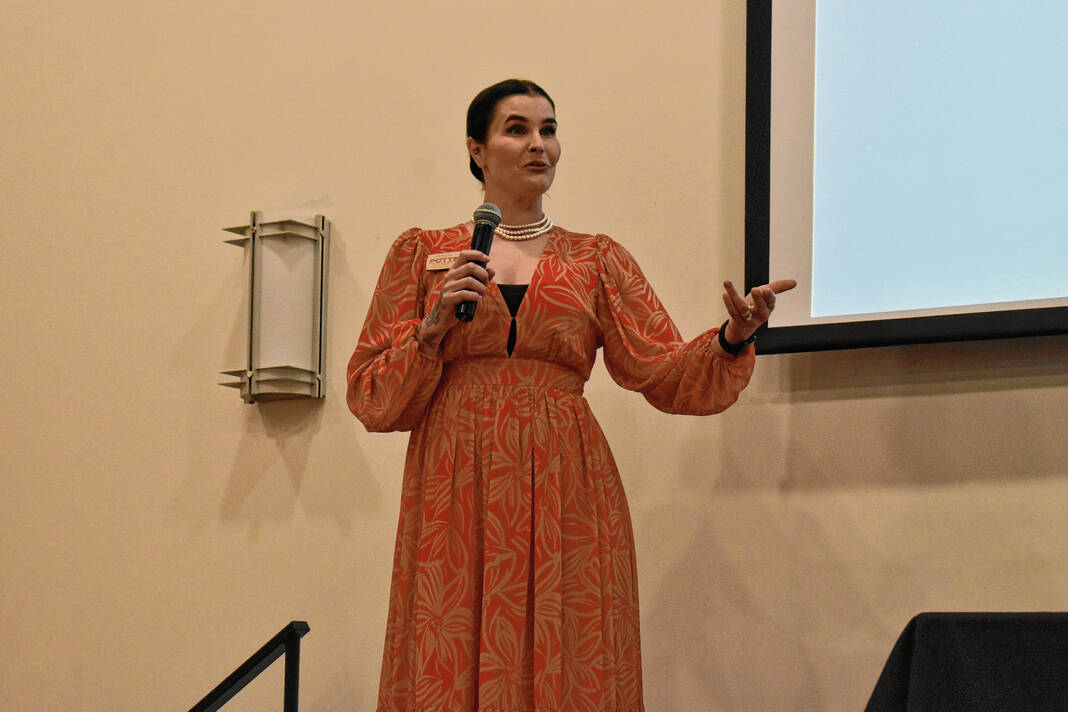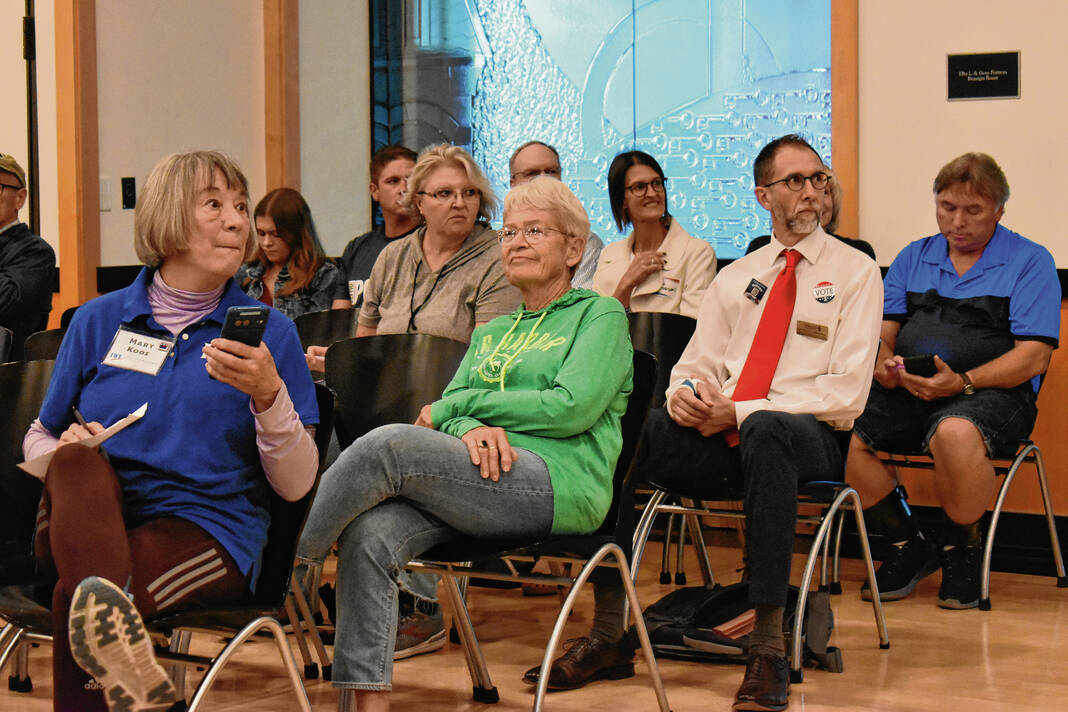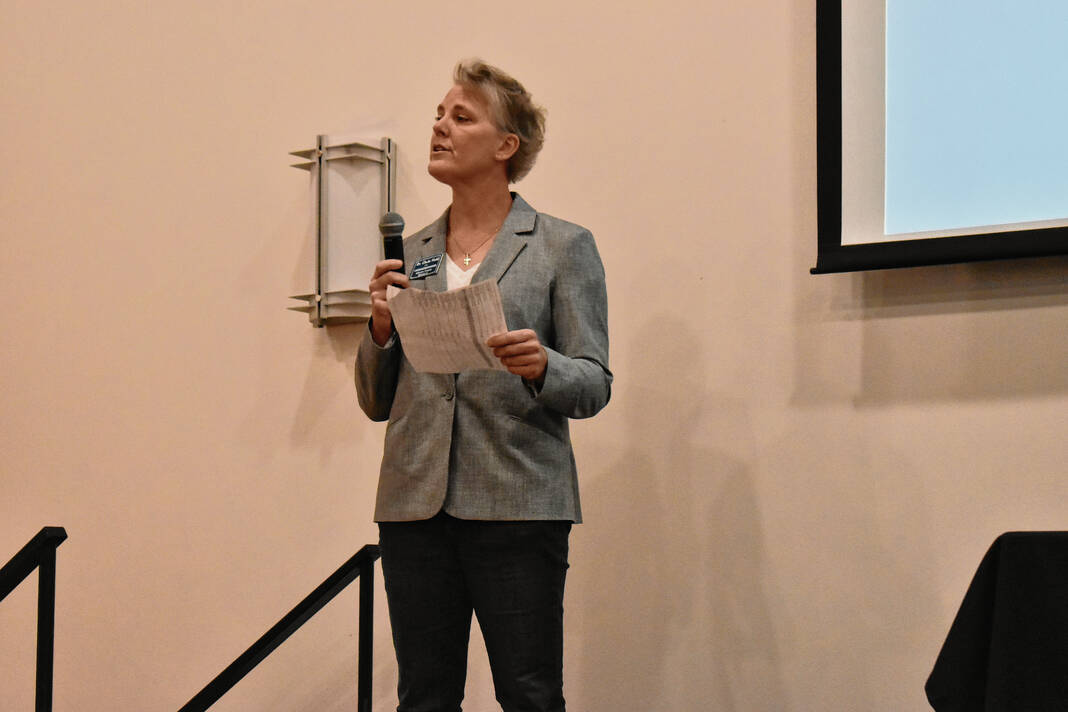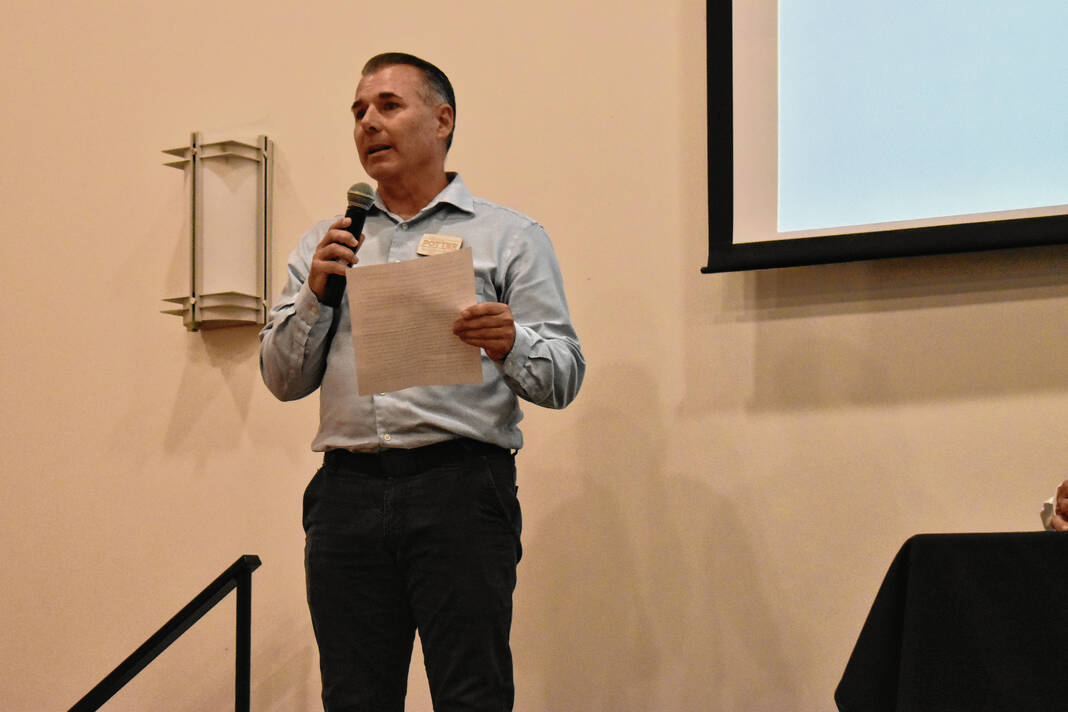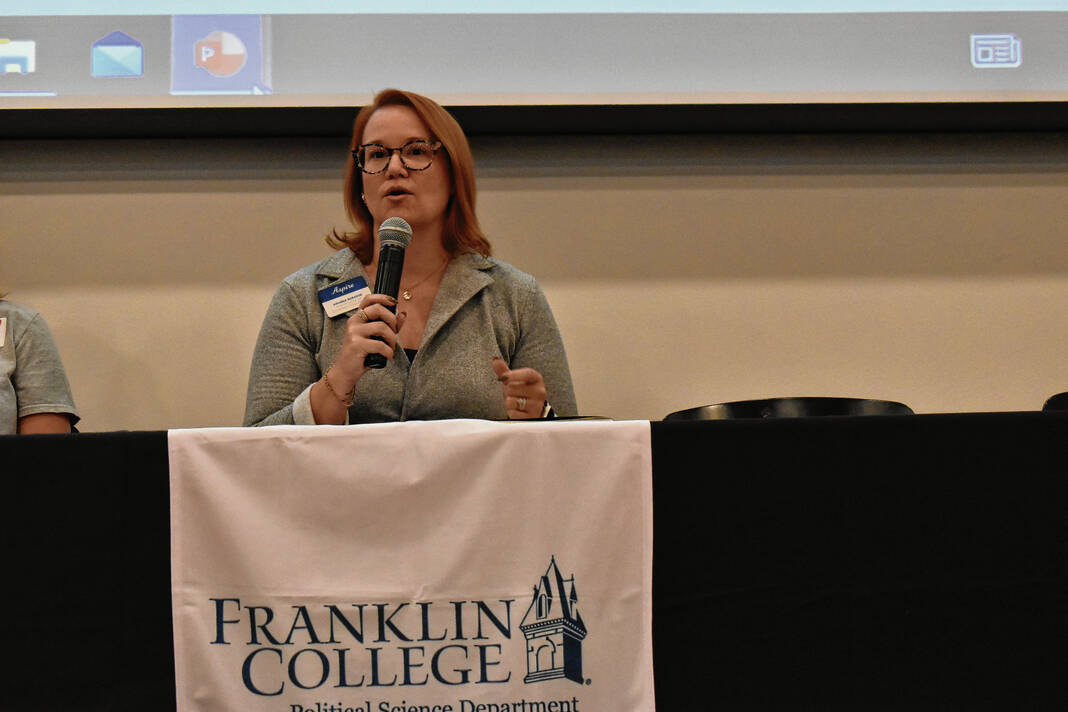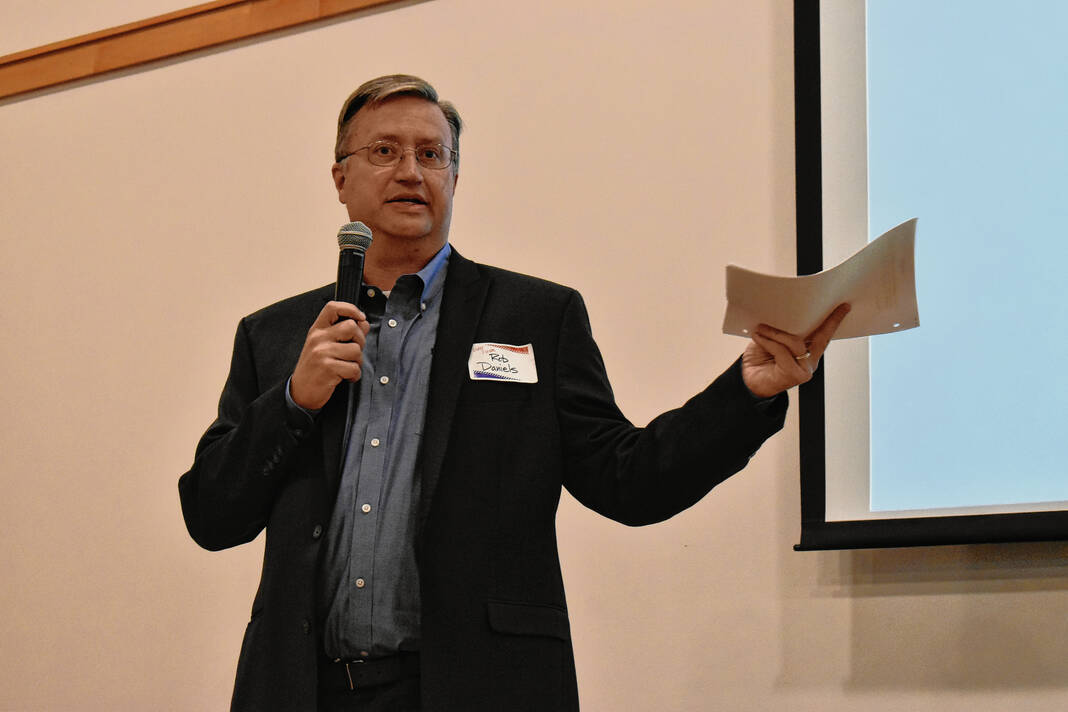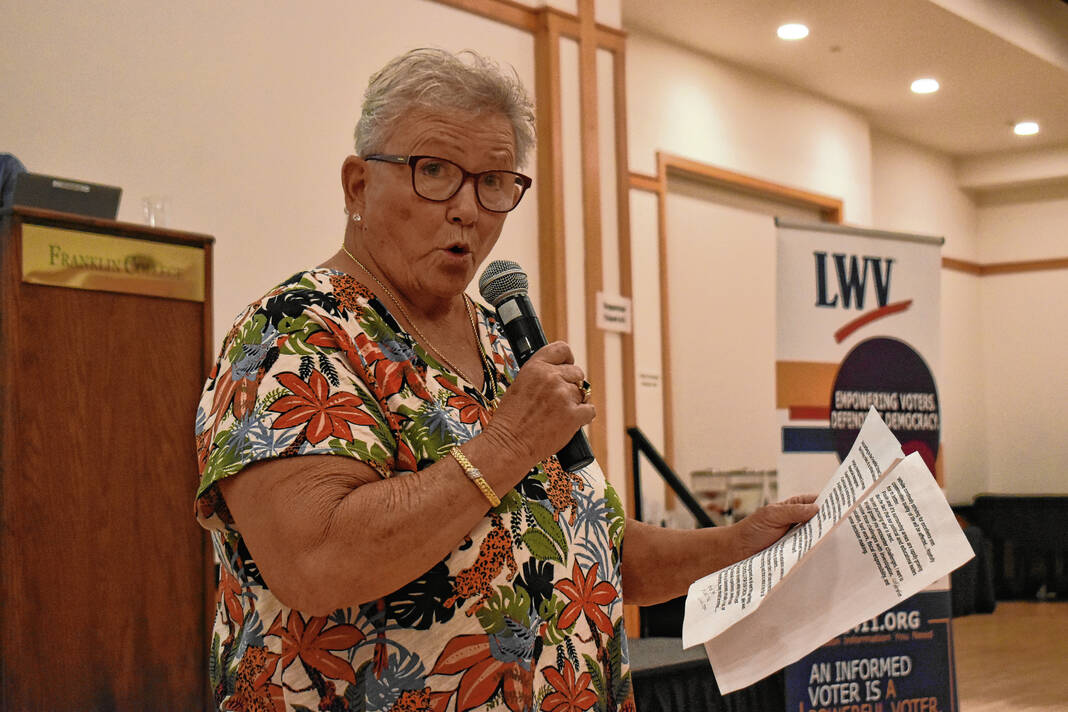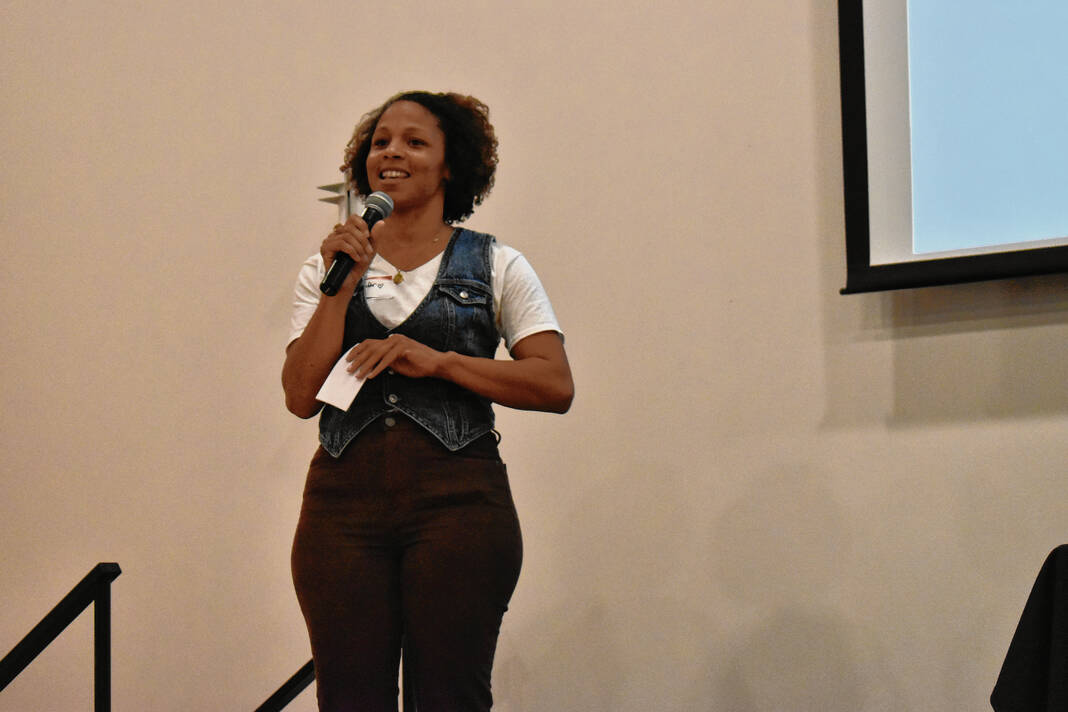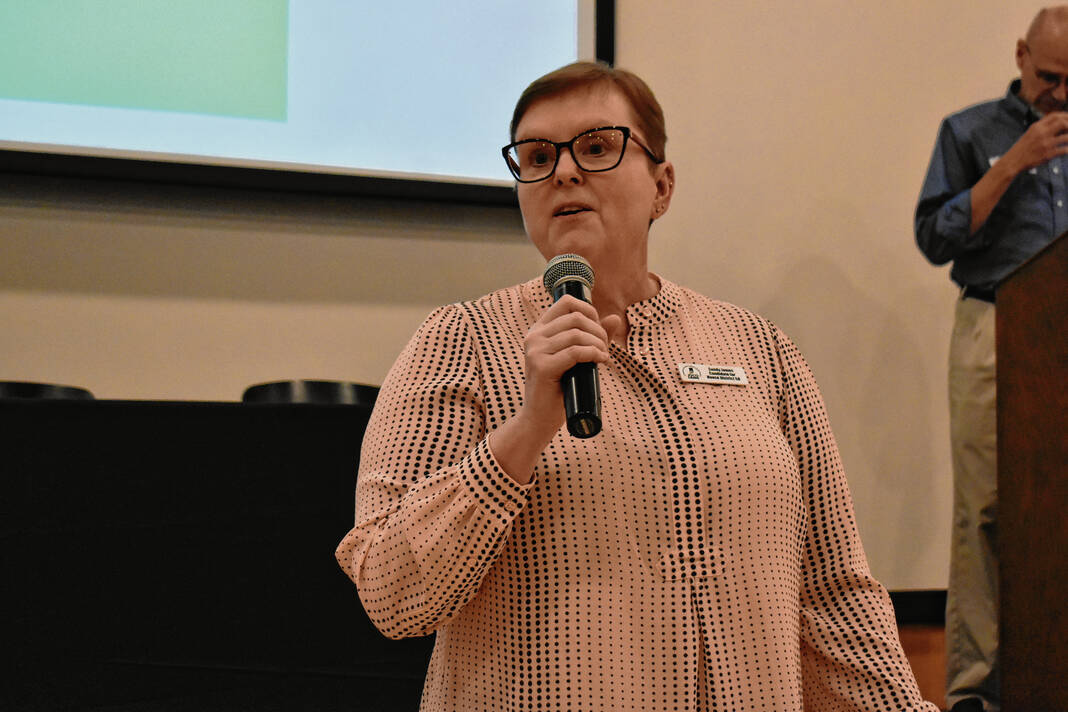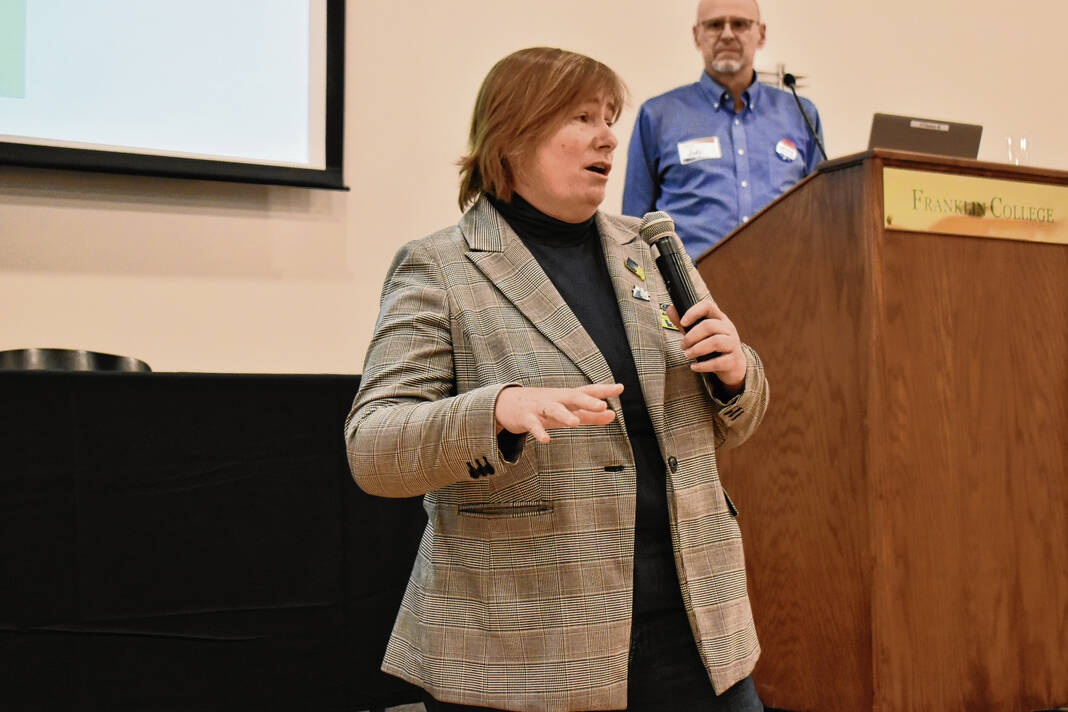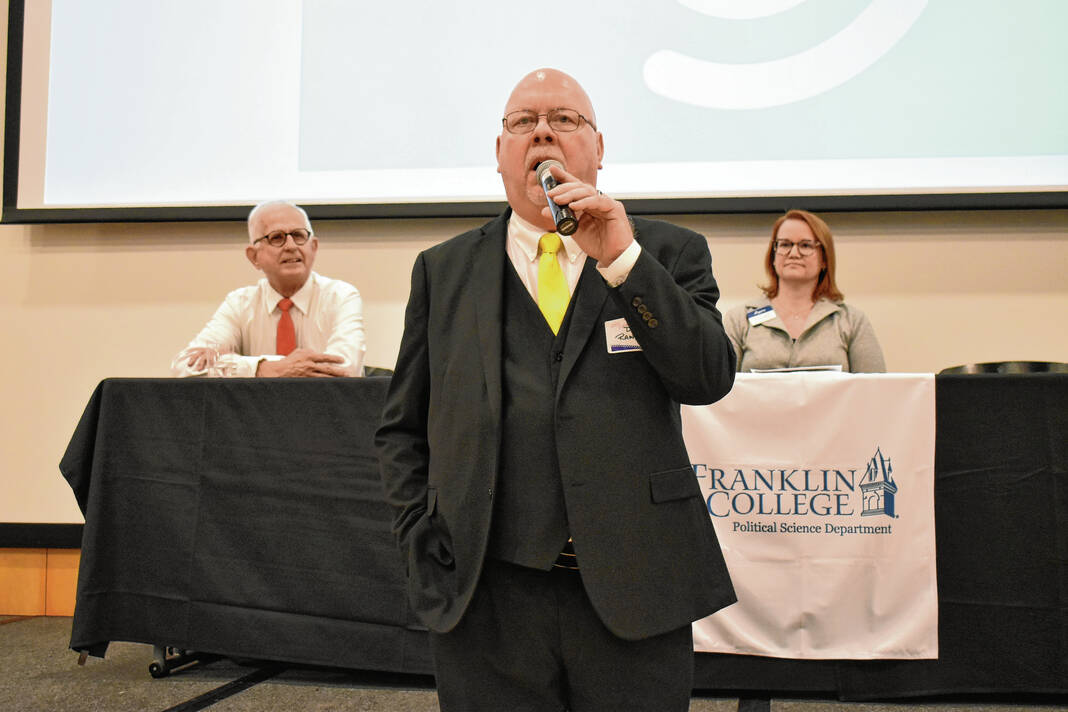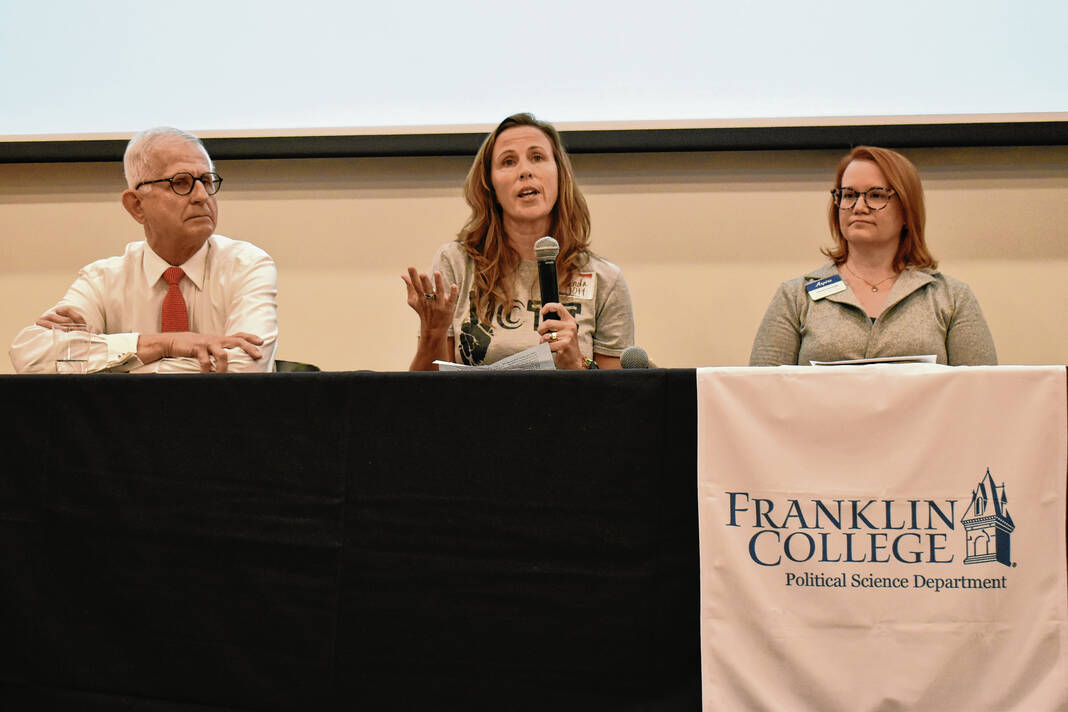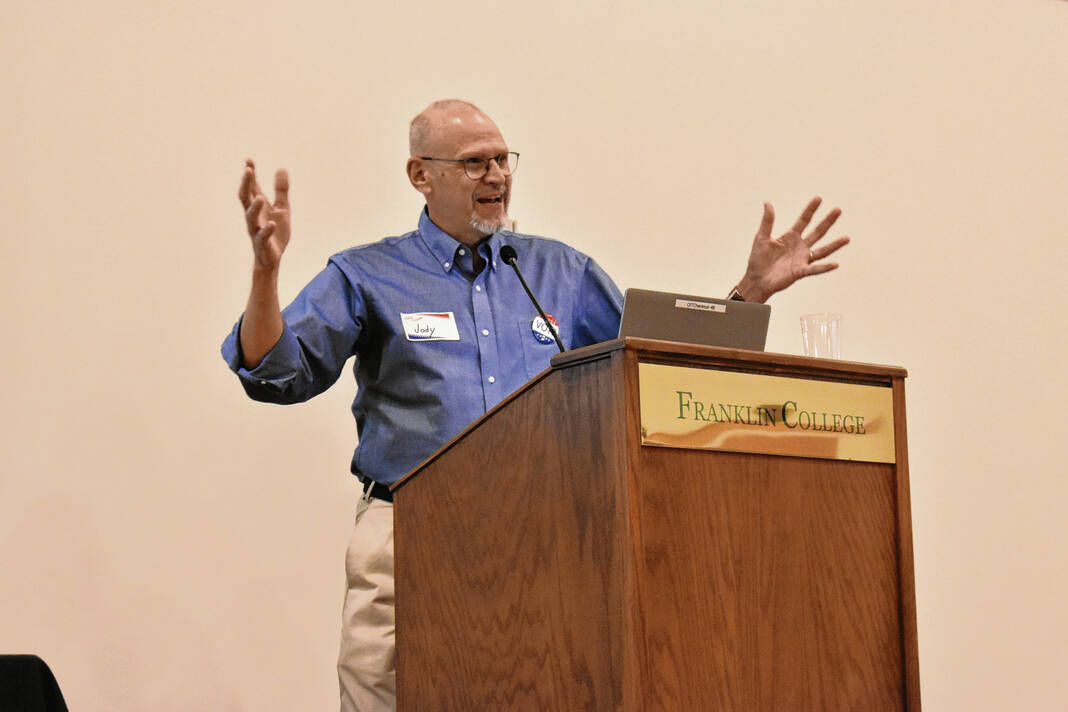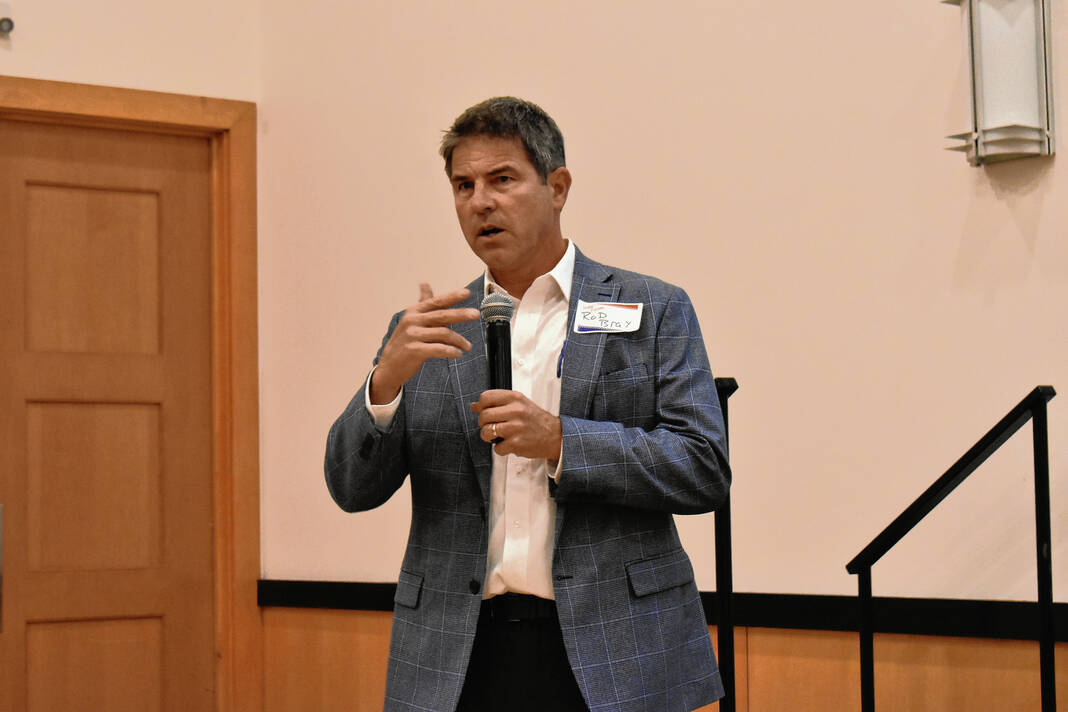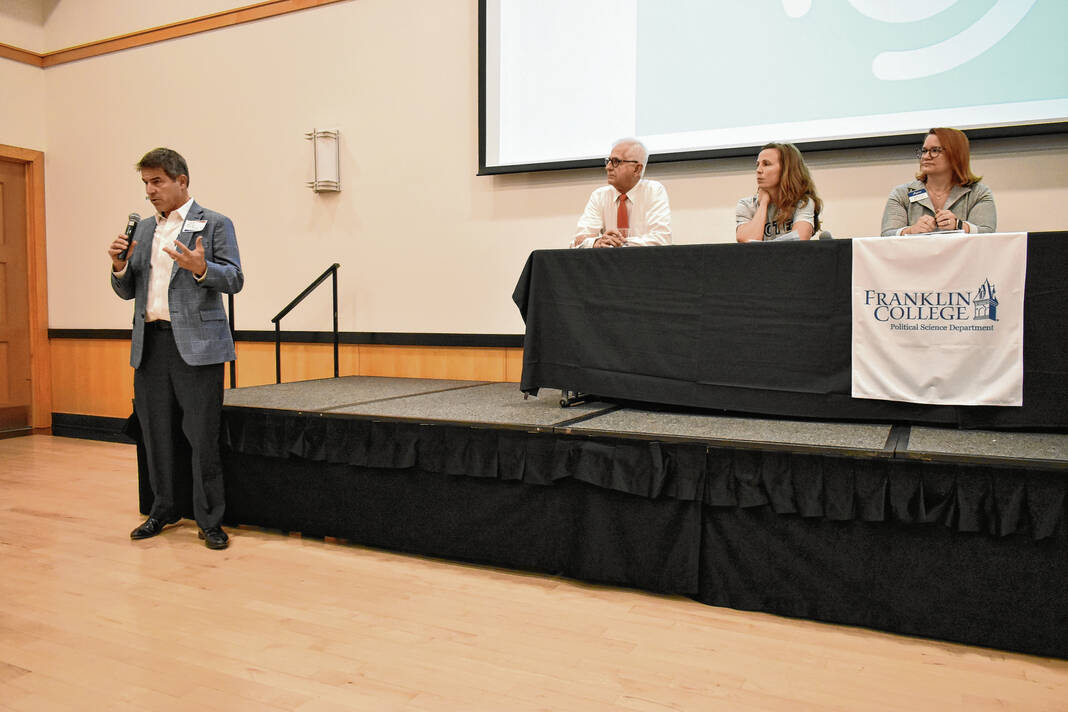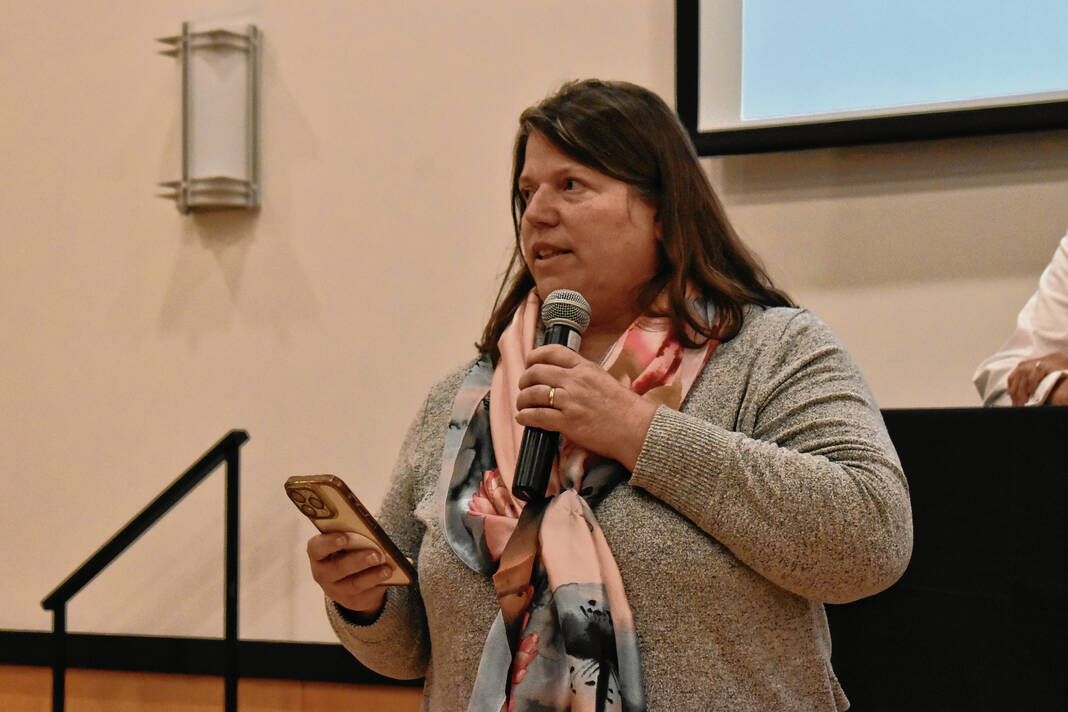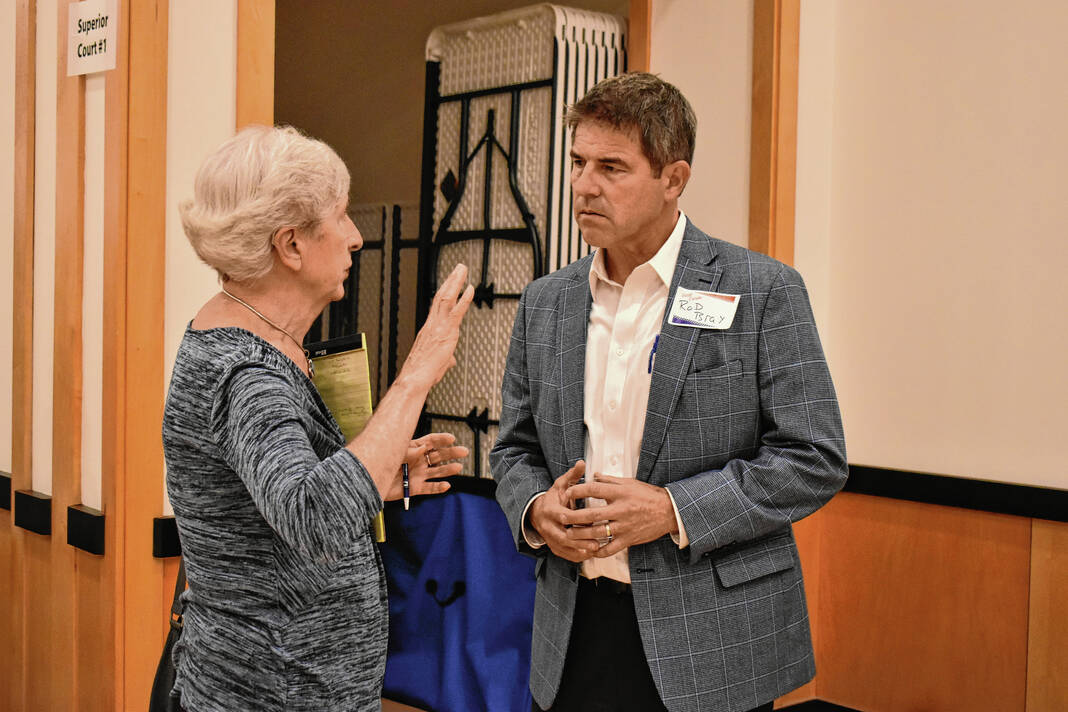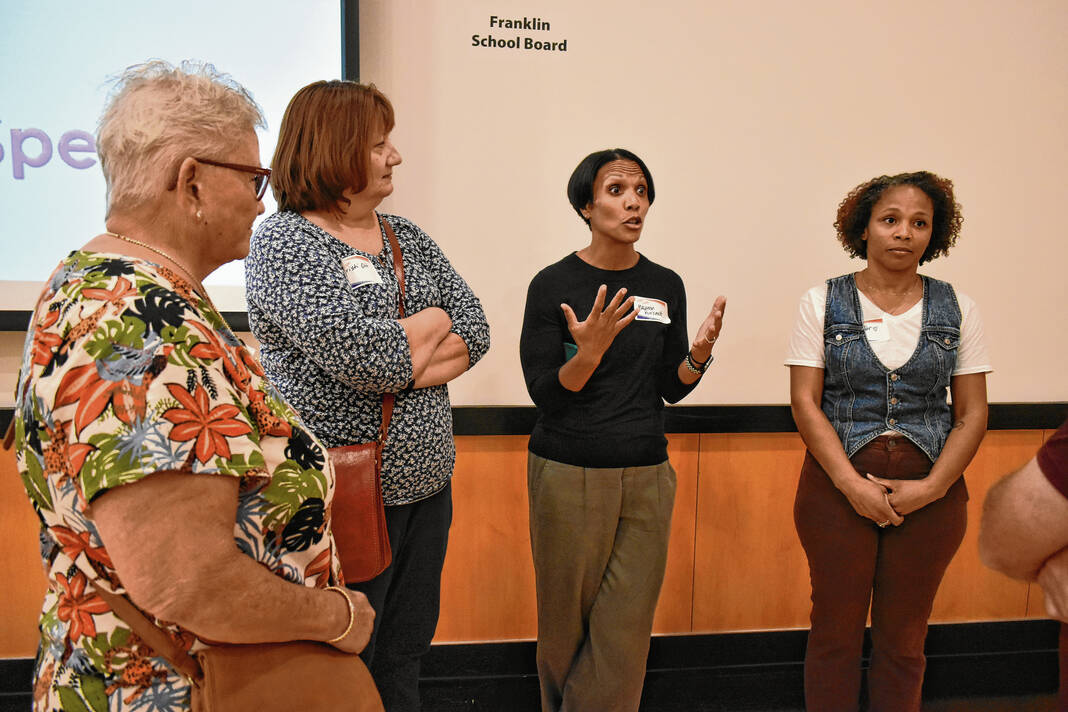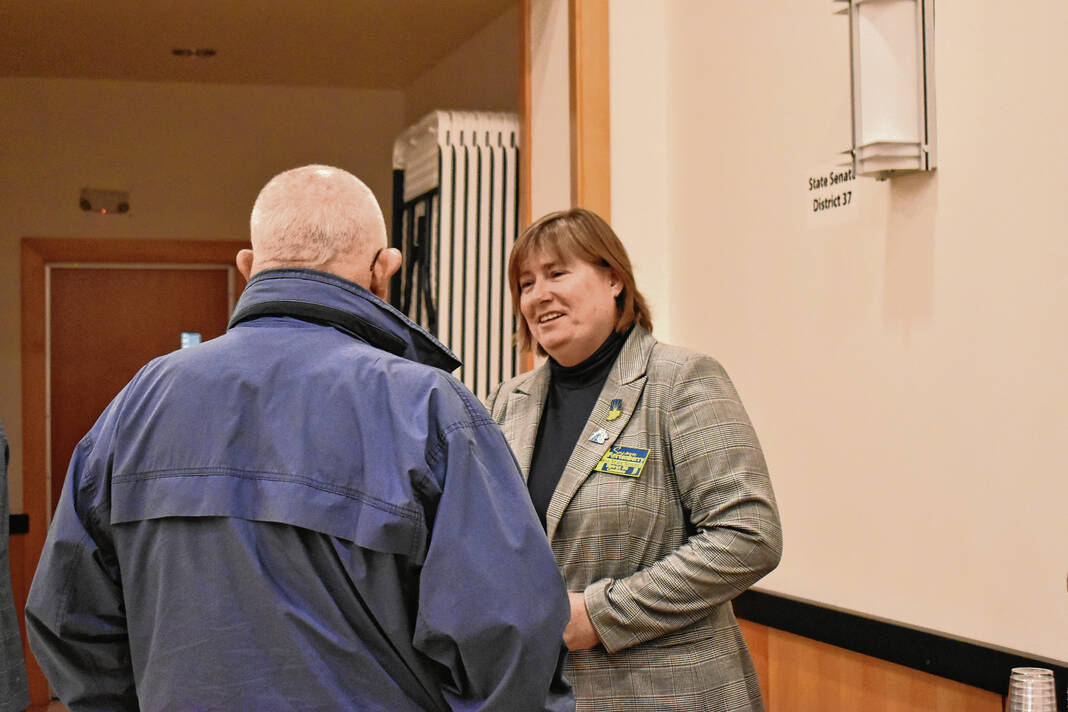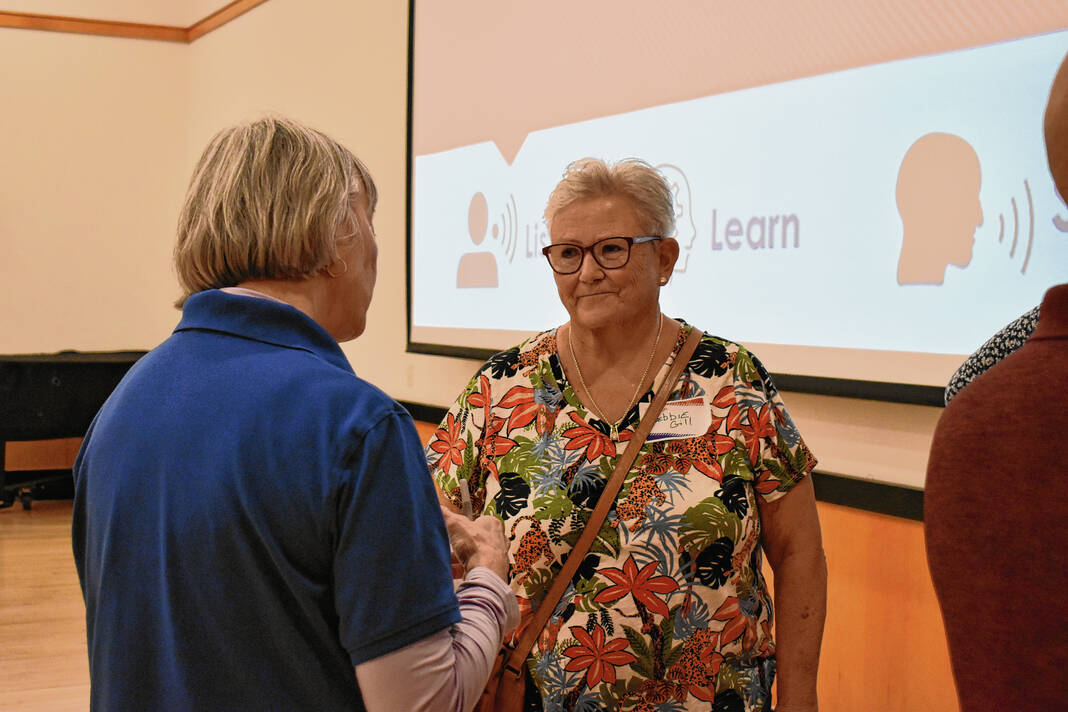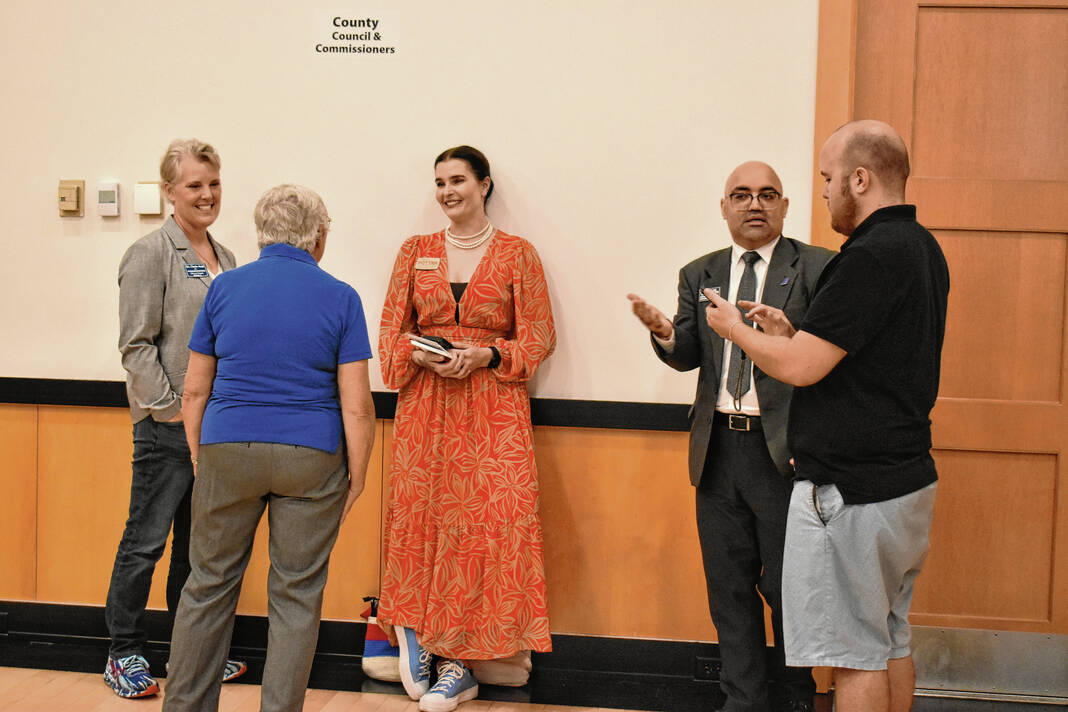
Donald Rainwater, the Libertarian candidate for Indiana Governor, answers a question at the Johnson County Voter Forum held Wednesday at Franklin College. The forum was organized by the Daily Journal, Bridges Alliance of Johnson County, League of Women Voters of Johnson County and the Franklin College Department of Political Science. Leeann Doerflein | Daily Journal
Quality of life, economic development, education, housing and health care were the topics of the night for candidates at the voter forum in Johnson County this week.
Several dozen voters listened to and met with approximately 20 local and state candidates at Wednesday night’s voter forum in the Branigin Room in Franklin College’s Napolitan Student Center. Local experts presented on quality of life with economic development, housing, schools and health care, while candidates chose what issues to speak on and answered questions from the audience.
The forum was hosted by the Daily Journal, Bridges Alliance of Johnson County, the League of Women Voters of Johnson County and Franklin College’s Department of Political Science.
Candidates on Johnson County’s ballots from the governor’s office to local school boards were invited to join the forum. Candidates for Indiana Governor, Johnson County Commissioner District 3, at-large Johnson County Council, Johnson Superior Court 1, Indiana Senate District 37, Indiana Senate District 36, Indiana House District 47, Indiana House District 58, Indiana House District 60, Center Grove School Board and Franklin School Board attended the forum.
Attendees came to the event to hear from candidates and learn about their perspectives on different topics. Husband and wife Mark and Jo Burris from Indianapolis came to hear Libertarian candidate for U.S. Governor Donald Rainwater speak, while Darla Jo Parker from Franklin came to learn about the candidates without having to do a lot of research.
Franklin College political science students Spencer Fears and Camden Carlile from Trafalgar came to the event after it was promoted by faculty at the school to be informed on local issues.
Economic development
Amanda Rubadue, vice president of economic development for Aspire Johnson County, spoke on how quality of life intersects with economic development and gave insight from what she’s heard from site selectors.
She said having quality of life amenities attracts and retains businesses because employers want places where they can attain and attract a workforce and also give employees quality of life amenities. These amenities could include trails, parks, nearby coffee shops, safety and access to daycare and health care, Rubadue said.
On the flip side, having a thriving economy with industry can give a community more funding to provide quality of life to residents.
Michael Potter, Democratic candidate for Indiana House District 47, said he noticed several Republican candidates were not present at the forum and alleged they are “more concerned about corporations rather than the voters.” Potter thinks quality of life should be put ahead of business interests for the sake of residents.
“Of course, putting corporations first and quality of life at the end,” Potter said. “We cannot continue our quality of life leaning in towards the business owners. What if we restate the sentence in the following way, and I’ll leave you with this: ‘A healthy quality of life is essential for the quality of our businesses, creating a workforce and a growing economy.’”
Dr. Chele Heid, Democratic candidate for District 3 Johnson County Commissioner, said she is concerned about the number of residences being purchased by corporations and used as rental properties. She said “high quality of life is unattainable” if workers cannot afford housing within a reasonable commute.
Heid also criticized her competitor, current Commissioner Ron West, for spending money on pickleball courts.
“This, too, is a quality of life issue and you can bet I would have voted to use those funds in a way which would have benefited a greater number of residents, ” she said.
Blythe Potter, Democratic candidate for Johnson County Council, spoke on the need for trails and sidewalks, and increasing road repairs faster than what the current council is doing. Instead of pay raises for politicians, she said she wants money to be spent on “benefiting the community as a whole.” As a local business owner, she feels she has the experience to be a good steward of the county’s money.
Michael Chiappetta, a Democratic candidate for county council, said residents need “a champion” that will prioritize implementing the parks and trails plan. He alleged that there weren’t any “champions” for the two plans on the council currently.
Saad Tawfeeq, a Democratic candidate for county council, spoke on focusing on infrastructure and parks, creating jobs and attracting investment. He also wants sustainable growth that is “balanced and responsible,” including dealing with infrastructure needs, implementing “sustainable development practices” and fiscal responsibility.
Schools
Jim Halik, Edinburgh’s interim superintendent, shared ideas for school board candidates from his 50 years of experience in public education. His ideas included making decisions based on the best interest of the majority of children, trying to retain consensus by voting yes on things a school board member may not like but can tolerate, creating a clear vision, remaining transparent with decisions and keeping confidential information secret even from loved ones.
Several candidates spoke on the role of school board members. Dr. Charity Flores, candidate for Center Grove School Board, wants transparency by fostering a communication mechanism between the school and the community, fiscal responsibility with elements like growth, facilities, teacher retention and pay, and support for students including those in special education and English-language learners.
Nicole Kemp, candidate for the Center Grove School Board, said school board members, among other responsibilities, ensure safety through an inclusive environment and meeting student’s academic, social, emotional and physical needs, including with diverse opportunities for students and with mental health. She also said school board members have fiscal responsibility including with competitive pay for educators and placed importance on “get(ting) public dollars back in public schools,” among other ideas.
Rob Daniels, incumbent candidate for Center Grove School Board, said he believes the role involves fiscal responsibility, preparing students for the future and openness and transparency. He believes there is “so much information” on the website and being sent to parents and although the school can get better on helping parents find things, the information is there.
A common theme from candidates was making decisions for all students, including from Daniels, Franklin School Board candidates Debbie Gill and Jennifer Briggs-Mann.
“No matter one’s background, we all want the same thing: safe, great schools for our children. We want them to pursue their dreams while having the best possible educational experiences,” Gill said.
Briggs-Mann agreed, adding that she doesn’t have an agenda and wants “a seat at the table” to better understand and be part of school decisions.
Sandy James, a Democrat running for Indiana House District 58, said school vouchers are being misused and as a result are making public schools lose money, referencing an Indianapolis Star article. She said money was given to private and parochial schools which only spent a small percentage of the funding on students.
“I see dedicated teachers every day bending over backward with very little resources,” said James, who teaches at Greenwood Community High School. “To see that amount of money leave and not be anywhere near a public school, it’s your tax money that is gone and it’s going to mostly wealthier families to help insulate their tuition to private schools.”
Suzanne Fortenberry, Democratic candidate for Indiana Senate District 36, said she wants to be “a voice for the working class, to be there, to stand up for those of us who have felt unseen and unheard in the statehouse for all of this time.” She echoed the sentiment that everyone wants the same things, like a safe place to live, education for kids and public safety to be taken care of.
Rainwater, Libertarian candidate for Indiana Governor, attended the voter forum because he was not invited to FOX59/CBS4’s governor debate the same night. He said the definition of quality of life is personal and different for each person, so he believes education should stay local.
“The school board is the legislative branch of your local school district — not the Indiana General Assembly, not the U.S. Congress — the school board,” he said, “And we need to get back to the place where the school boards, the parents and the teachers determine what is the proper quality of life in every local school district.”
Housing
Amanda Ott, board president of the Johnson County Housing Coalition, presented information on several misconceptions people have with housing in the county. Despite myths, she said one in four households in Johnson County are struggling when it comes to housing, which means they are asset-limited, income constrained and employed.
According to MIBOR data, 51% of central Indiana residents prefer to live in smaller lot homes with a walkable neighborhood over a large lot, auto-dependent homes. She also said appraisers only compare houses that are alike when assessing homes, debunking the myths that smaller homes or rental units will decrease the value of larger homes nearby.
“There’s not one answer that fits every place, every town, but just to sort of realize that maybe the loudest voice in the room may not have all the right data,” Ott said.
No candidates chose to speak on housing during the voter forum.
Health care
Dr. David Dunkle president and CEO of Johnson Memorial Health, was unable to attend the voter forum but still gave a statement. In his statement, he said some issues the independent hospital has been facing are unfair reimbursements from Medicare, rising costs for supplies and medication and an increase in insurance claim denials despite “record profits from the insurance industry.”
Rod Bray, incumbent Republican candidate for Indiana Senate District 37 and Senate President Pro Tempore, said the Senate has been trying to put pressure on hospitals like Indiana University, Ascension and Community and tried to remove gag clauses, provide good faith estimates and contribute to the all-payer claims database. The database is a website where Hoosiers can shop for the best health care prices in their area that recently launched.
“Indiana is a low-cost state so there really is no reason that we should be about the seventh highest in our hospital costs around as it compares to other states in the nation,” Bray said.
Michelle Higgs, Democratic candidate for Indiana House District 60, said health care is a big issue for her. The number of hospitals in the state is shrinking and “Indiana was already failing for maternal health care” even before the abortion ban caused a decrease in OBGYN providers, she said.
“I believe we need a state government that protects Hoosiers by stopping monopolistic business practices that create health care deserts,” she said. “We need to prevent private equity companies from buying up medical practices to maximize profits, and we need to audit our Medicaid budget for administrative price gouging, rather than cover a budget shortfall by taking from our most vulnerable on Medicaid who can least afford it.”
Audience Q&A
The first question asked to candidates was on tax abatements. The question referenced a Michael Hicks column printed in the Daily Journal on “the failure of tax payments and similar policies to significantly improve Indiana’s economy.”
Chiappetta agreed with Hicks, saying tax abatements aren’t a winning formula and the money brought in by new businesses should instead be invested in education and quality of life that will attract industries.
“You can give all of these companies the abatements but in the end, it doesn’t move our county where we want it to be,” he said. “We want a high quality of life with high-quality jobs, with high-quality communities with skilled workers and that formula that he was talking about has already been proven not to work.”
Potter recommended asking companies to instead help invest in needed infrastructure, like trails and sidewalks that connect to places and get residents to businesses or warehouses.
Another question related to capped property tax increases. Rainwater advocated for a “true cap of a solid value, not an imagined value” with an end date. Fortenberry agreed with the “legitimate” cap on property taxes increases but also that the state would need to figure out how to pay for things that are currently paid with property taxes, like schools, the gas tax, roads and police.
Candidates were asked whether they were in favor of borrowing money to fix roads and pay it back with an increase in income tax. Chiappetta said it would be “a fantastic debt to incur” to make roads better.
A question for judge candidate Brandi Foster Kirkendall was presented, asking if there were alternative approaches to incarceration. Foster Kirkendall gave problem-solving courts as an alternative to incarceration, including the re-entry court, drug court, mental health court, juvenile problem-solving court and veterans court already in the county.
At the end of the event, candidates spoke with voters in an informal meet and greet.
WATCH THE VOTER FORUM BELOW




